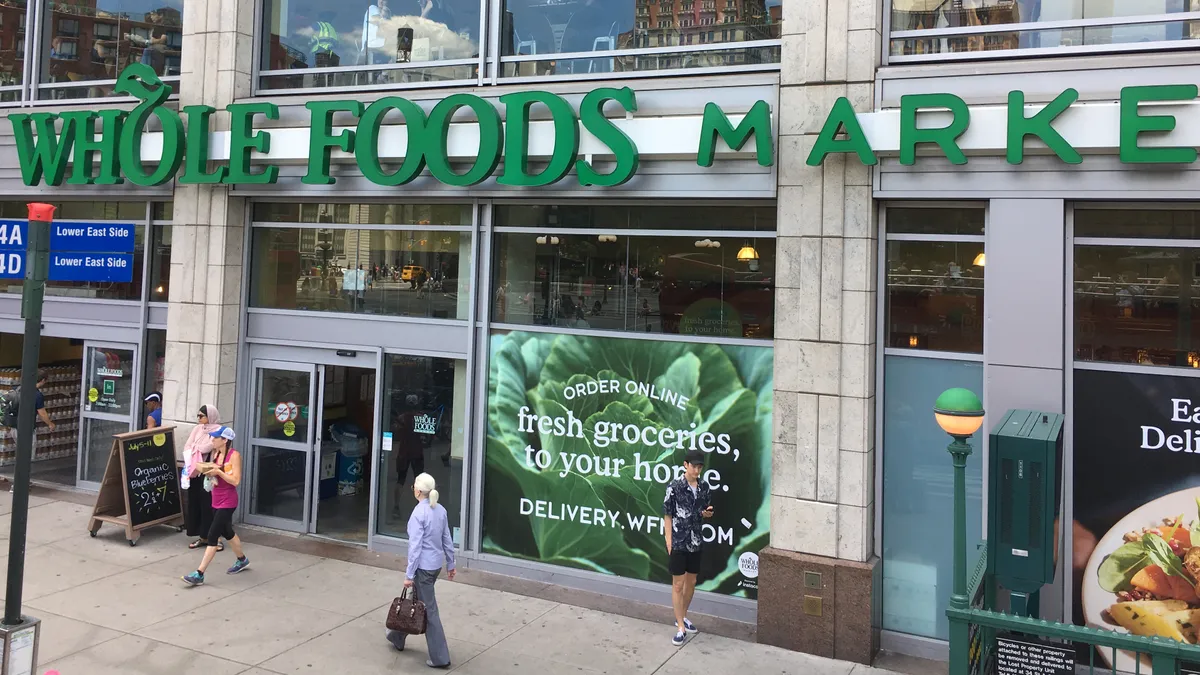Dive Brief:
- Whole Foods is suing Direct Action Everywhere (DxE), a California animal rights group, for alleged illegal trespassing and repeated store takeovers. For several years the group has held ongoing protests at Whole Foods locations throughout the state. Last week, Northern California's Superior Court of Alameda County granted the grocery chain a restraining order against DxE, which prevented a planned protest in Berkeley.
- In a statement, Whole Foods said, "DxE members have repeatedly entered our stores and property to conduct demonstrations that disrupt customers and team members by blocking access to our aisles, departments and cash registers, interfering with our business and putting the safety of both customers and team members at risk."
- The activist group claims it is acting in the interest of the public and has reportedly recorded and posted some of its demonstrations on social media. Matt Johnson, a spokesperson with DxE, told Food Dive that the group holds only peaceful, non-violent protests.
Dive Insight:
The activist group has been targeting Whole Foods since 2015 over meat sourcing and animal cruelty, and it appears that Whole Foods has finally had enough. Whole Foods is within its rights to ban activists and protestors from its stores. Under federal law, businesses have the right to admit or ban people from their property, provided they are not violating the Civil Rights Act or the Americans with Disabilities Act. People can be banned if they pose a safety threat or are proving to be unruly or disrupting business operations.
Johnson with DxE told Food Dive that the group has been investigating Whole Foods' farms around the country for four years, and has found that the grocer is sourcing from factory farms. "They are treating animals horribly and taking advantage of their consumers who are willing to pay extra because they believe these animals are being treated well," Johnson said.
Whole Foods has been combatting DxE's claims for some time now. And while there could be concern that some customers might take the protestors seriously, shoppers are often uncomfortable with protesting and the chaos it brings to their experience. On the other hand, there is a possibility that DxE's actions may raise more questions among consumers and media, and Whole Foods may have to start providing more details related to its sourcing practices depending on the public response.
California is home to countless activist groups, especially in Berkeley, and petitioning, loitering and protesting are common. On a daily basis the state sees protests related to politics, education, law enforcement, environmental issues and more. Legal action is not a step many businesses or organizations want to take, but Whole Foods has the resources to do so, and is clearly trying to send a message that protests will not be tolerated in its stores.
Other grocers have taken action against protestors and activist groups in the past, including a 2013 Walmart lawsuit against Florida labor unions and a recent attempt by Trader Joe's to get a restraining order against Airbnb for loitering outside its stores — though neither of these situations dealt with animal rights groups. The Whole Foods case appears to be the only current effort by a grocer against animal rights activists, and the only major one in recent history.











